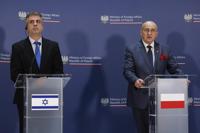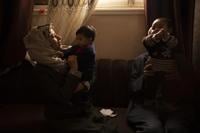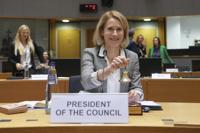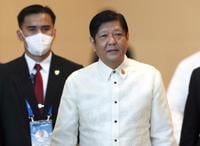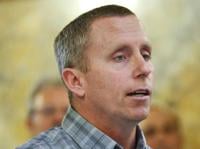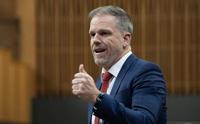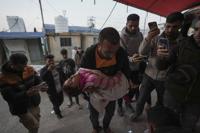WARSAW, Poland (AP) — The foreign ministers of Israel and Poland hailed a meeting they had Wednesday as a breakthrough in restoring a relationship that has been badly damaged for years due to disagreements over how to remember Polish behavior during the Holocaust.
The ministers signed an agreement that they said would allow for the resumption of to Poland, one of several tension-causing points of contention between the two countries.
Israeli Foreign Minister Eli Cohen's visit to Poland was the first at that level since 2018. Poland's Foreign Ministry said Israeli President Isaac Herzog plans to attend observances next month for the 80th anniversary of the Warsaw Ghetto Uprising, an armed 1943 revolt by Jews in German-occupied Poland .
“I came here to restore the relationship between our countries, and I found in you, my distinguished colleague, a trusted partner,” Cohen said at a news conference alongside Polish Foreign Minister Zbigniew Rau, whom he referred to more than once as his friend.
“This is an important moment in the relations between our countries,” Cohen said.
Poland has been one of Israel’s closest allies in Europe over the years, and Israel appears eager to restore that relationship. Israel is also trying to shore up foreign alliances at a time when its new far-right government, which took office in December, has seen its relations with the United States and European Union deteriorate.
Israeli Prime Minister Benjamin Netanyahu has visited France, Italy and Germany in recent weeks and is scheduled to head to Britain in the coming days.
The tensions of the past years were marked by a withdrawal of ambassadors and a planned visit to Israel in 2019. Israel has since returned an ambassador to Poland, but there is still no Polish ambassador in Israel.
In Israel, the Foreign Ministry issued a statement Wednesday saying the diplomatic crisis with Poland was over.
Cohen said that Poland has agreed to return an ambassador to Israeli, and Netanyahu said that “this decision marks a positive step forward in our diplomatic relations.”
But Polish Foreign Ministry spokesman Lukasz Jasina told The Associated Press that there is still no decision about the naming of a new ambassador to Israel.
The disagreements between the nations are rooted largely in the Holocaust and how to remember Polish involvement in the killing of Jews by German forces during World War II.
Nazi Germany occupied Poland in 1939 and killed millions of Jews and non-Jews. Unlike other countries occupied by Germany, there was no collaborationist government in Poland. While some Poles risked their lives to save Jews, others helped the Germans hunt down and kill them.
Poland's governing nationalists have sought to depict Polish crimes as a marginal phenomenon and focus almost exclusively on remembering the Polish heroes who helped Jews. Historians, Israeli authorities and Jewish survivors who suffered persecution at Polish hands before, during and after the war have condemned the nationalist position and accuse the government of seeking to whitewash history.
For years, young Israelis made pilgrimages to Auschwitz and other Holocaust sites, as well as historic Jewish sites in cities like Krakow and Warsaw. But Israel canceled the trips last year, claiming the Polish government was trying to control the Holocaust-studies curriculum taught to Israeli children.
Poland, in turn, rejected Israel's demand to have security guards join organized Israeli school visits to Poland. The Polish officials argued that Poland was a safe country and the presence of armed guards perpetuated an image of it as an antisemitic place where Jews need protection.
Cohen and Rau signed an agreement that will allow for the immediate resumption of youth delegations.
Rau said the agreement “opens prospects for relations that are balanced, equal and based on reciprocity.”
He said he received “with satisfaction” Israel showing understanding for Poland’s view that it was unnecessary to have armed Israeli guards in addition to Polish security, which will be provided to the groups whenever needed.
Ties began to deteriorate when Poland passed a Holocaust speech law that made it illegal to blame Poland as a nation for the Holocaust. The legislation eventually was watered down, and it still has not been applied in practice.
Three years later, Poland's parliament passed a law that effectively left Holocaust survivors and their descendants unable to reclaim property seized by the post-WWII communist regime.
Poland for centuries was home to a large Jewish community that numbered 3.3 million on the eve of the Holocaust. Only about 10% survived, and postwar persecution drove out many more. Today's Jewish community is very small but has seen some growth since the end of communism more than three decades ago.
Israel was founded in the wake of the Holocaust as a refuge for Jews. It is home to a large but rapidly dwindling population of Holocaust survivors and its annual Holocaust memorial day coincides with the memory of the Warsaw Ghetto uprising.
___
Monika Scislowska in Warsaw contributed.


